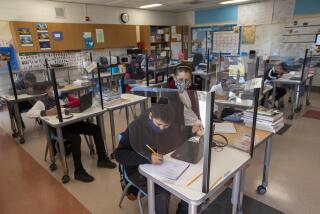Less English Urged in Bilingual Teaching
- Share via
WASHINGTON — Bilingual students need more instruction in their native languages instead of more in English, according to an unpublished report that harshly criticizes Education Secretary William J. Bennett’s approach to bilingual education.
The report, a compilation of the views of various experts, says that voluminous data shows that most bilingual programs nationwide use no native languages at all--a contention the Education Department disputed Tuesday.
And, according to the 141-page report, the nation’s schools already exercise “flexibility” in structuring their programs, something Bennett has said is lacking in the controversial bilingual education programs.
The study by the House Education and Labor Committee, a copy of which was obtained by The Times, represents the most comprehensive effort to refute Bennett’s criticism of bilingual education. Its release, expected this week, is likely to intensify the battle on the issue with the Reagan Administration, which is trying through legislative and regulatory changes to allow the use of more English in the program.
Written by Experts
The report is divided into nine sections written by bilingual education experts, most of whom are professors at universities, including the University of California, Georgetown, Harvard and the University of Illinois. It covers subjects ranging from effectiveness of the programs to the worsening shortage of bilingual teachers.
Committee Chairman Augustus F. Hawkins (D-Los Angeles) said the panel is publishing the papers “because we feel that bilingual education policy decisions should be based upon relevant and educated research, not on inflammatory rhetoric.” He accused the Education Department of “stirring up massive hysteria” in its effort to effect changes.
Critics of Bennett hailed the new report as a scholarly ally in their battle.
There is “a growing body of research” linking children’s cognitive development to literacy in native languages before English is studied, Mary Carol Combs, educational projects coordinator for the League of United Latin American Citizens, said in an interview.
Indeed, Rudolph C. Troike, professor of educational policy studies at the University of Illinois, wrote in his paper for the committee:”The best bilingual program might well be one in which no English at all was used for the first two years, while students were developing a solid base of knowledge and skills through their native language.”
‘Transfers Readily’
In his paper, James E. Alatis, dean of the school of languages and linguistics at Georgetown University, agreed, writing that “native-language instruction is the key” to students’ success in subjects like mathematics, science and social studies.
And in a joint paper, Kenji Hakuta, associate professor of psychology at Yale, and Catherine Snow, associate professor in Harvard’s graduate school of education, wrote that research “suggests that most of the learning that goes on in the native language transfers readily to English.”
Despite these findings, wrote Daniel M. Ulibarri, director of the National Clearinghouse for Bilingual Education, “more than half” of the programs use no native language at all.
Therefore, he called the controversy over more alternatives “moot” and argued that because truly bilingual programs have not been implemented, “it is the alternative programs that have produced the current equivocal evaluation results.”
In an interview, another contributor, Richard P. Duran, associate professor at UC Santa Barbara’s graduate school of education, said that if native languages were used less, “the form of English used would be so simplified as to retard the development of children’s higher order of thinking.”
‘Appropriate Steps’
At the Education Department, Undersecretary Gary L. Bauer said:”If research starts to show that more native language is imperative . . . we would hope that local school districts would take appropriate steps to use the most recent research.”
However, he added, “our problem is that the research is in flux, and it makes no sense for Washington to mandate with its funds one approach to helping language-minority children.”
Bennett fired the first shot in the bilingual war last September when he said in a New York speech that there was “no evidence” that children have benefited from 17 years of federal bilingual programs.
Citing the need for “flexibility,” Bennett subsequently proposed legislation that would allow more English to be used in federally funded bilingual programs. Under his proposals, more money would be available for alternative methods, such as “immersion” in English.
But congressional critics and groups representing Latinos, the nation’s largest language minority, have accused Bennett of trying to destroy bilingual education and are fighting the proposed legislation.
More to Read
Sign up for Essential California
The most important California stories and recommendations in your inbox every morning.
You may occasionally receive promotional content from the Los Angeles Times.













